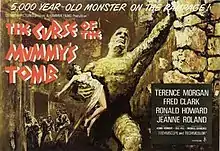The Curse of the Mummy's Tomb
The Curse of the Mummy's Tomb is a British horror film produced, written and directed by Michael Carreras, starring Terence Morgan, Ronald Howard, Fred Clark and introducing Jeanne Roland.
| The Curse of the Mummy's Tomb | |
|---|---|
 British quad poster | |
| Directed by | Michael Carreras |
| Produced by | Michael Carreras[1] |
| Screenplay by |
|
| Starring |
|
| Music by | Carlo Martelli[1] |
| Cinematography | Otto Heller[1] |
| Edited by | Eric Boyd-Perkins[1] |
Production companies |
|
| Distributed by | British Lion-Columbia Distributors[2] |
Release date |
|
Running time | 79 minutes[3] |
| Country | United Kingdom[2] |
| Budget | £103,000[1] |
Plot
"Egypt in the year 1900". A mummy is discovered by three Egyptologists: Englishmen John Bray (Ronald Howard) and Sir Giles Dalrymple (Jack Gwillim) as well as French Professor Eugene Dubois (unbilled Bernard Rebel, who died three weeks before the film's UK premiere). Assisting in the expedition is Professor Dubois' daughter, and Bray's fiancée, Annette (Jeanne Roland), herself an Egyptology expert. All the artifacts are brought back to London by the project's backer, American showman Alexander King (Fred Clark), who plans to recoup his investment by staging luridly sensational public exhibits of the Egyptian treasures. Soon after arrival, however, the mummy revives and starts to kill various members of the expedition, while it becomes evident that sinister Adam Beauchamp (Terence Morgan), a wealthy arts patron whom members of the expedition meet on the ship returning to England, harbors a crucial revelation of the mummy's past and future.
Cast
- Terence Morgan: Adam Beauchamp, a secretive key character
- Ronald Howard: John Bray, the Egyptologist
- Fred Clark: Alexander King, the American promoter
- Jeanne Roland: Annette Dubois, daughter of Professor Dubois and John Bray's fiancée
- George Pastell: Hashmi Bey, representative of Egypt's colonial government and worshipful supplicant of the Mummy
- Jack Gwillim: Sir Giles Dalrymple, another Egyptologist
- John Paul: Inspector Mackenzie
- Dickie Owen: the Mummy
- Jill Mai Meredith: Jenny, Beauchamp's maid
- Michael Ripper: Achmed, Egyptian servant
- Harold Goodwin: Fred, one of Alexander King's workmen
- Jimmy Gardner: Fred's mate
- Vernon Smythe: Jessop, Beauchamp's butler
- Marianne Stone: Hashmi Bey's landlady
- Ray Austin: Stuntman: Assassin on board ship
Production
Hammer Studios originally offered the project to Universal Pictures in 1963.[3] The film credits Henry Younger as the screenwriter, while the screenplay was written by Michael Carreras and Alvin Rakoff.[1]
Release
The Curse of the Mummy's Tomb was released on 18 October 1964 by Columbia Pictures/BLC Films in support of The Gorgon.[3] The film was distributed by Columbia Pictures in the United States on 17 February 1965 also in support of The Gorgon.[3]
In North America, the film was released on 14 October 2008 along with three other Hammer horror films on the 2-DVD set Icons of Horror Collection: Hammer Films (ASIN: B001B9ZVVC) by Sony Pictures Home Entertainment, and on a double feature Blu-ray with The Revenge of Frankenstein by Mill Creek Entertainment in September 2016. Its title was misspelled on the Blu-ray spine as “Curese of the Mummy’s Tomb”.[4]
Critical reception
From contemporary reviews, Daily Cinema referred to the film as being "Eerie but routine shocker thrills. But, hand it to Hammer, they've got this kind of scary hokum down to a grisly art."[3] Variety commented on the plot of the film stating that "one needs a crystal ball to sort out the reasons for some of the contrived goings on in the modest and rather slapdash horror pic."[3] The Monthly Film Bulletin noted that "the sewer finale has a moderate grandeur" but stated that "it is some indication of the film's lack of inventiveness that the mummy's first appearance should be so lengthily delayed."[2]
In a retrospective review, AllMovie critic Cavett Binyon called the film a "rather dull mummy muddle".[5]
References
- Fellner 2019, p. 79.
- "Curse of the Mummy's Tomb, The". Monthly Film Bulletin. Vol. 31 no. 369. British Film Institute. October 1964. p. 148.
- Fellner 2019, p. 80.
- https://www.dvddrive-in.com/reviews/n-s/revengeoffrankensteinblu58.htm
- Cavett Binion. "The Curse of the Mummy's Tomb - Trailers, Reviews, Synopsis, Showtimes and Cast". AllMovie. Retrieved 8 July 2012.
Sources
- Fellner, Chris (2019). The Encyclopedia of Hammer Films. Rowman & Littlefield. ISBN 978-1538126592.
External links
| Wikiquote has quotations related to: The Curse of the Mummy's Tomb |